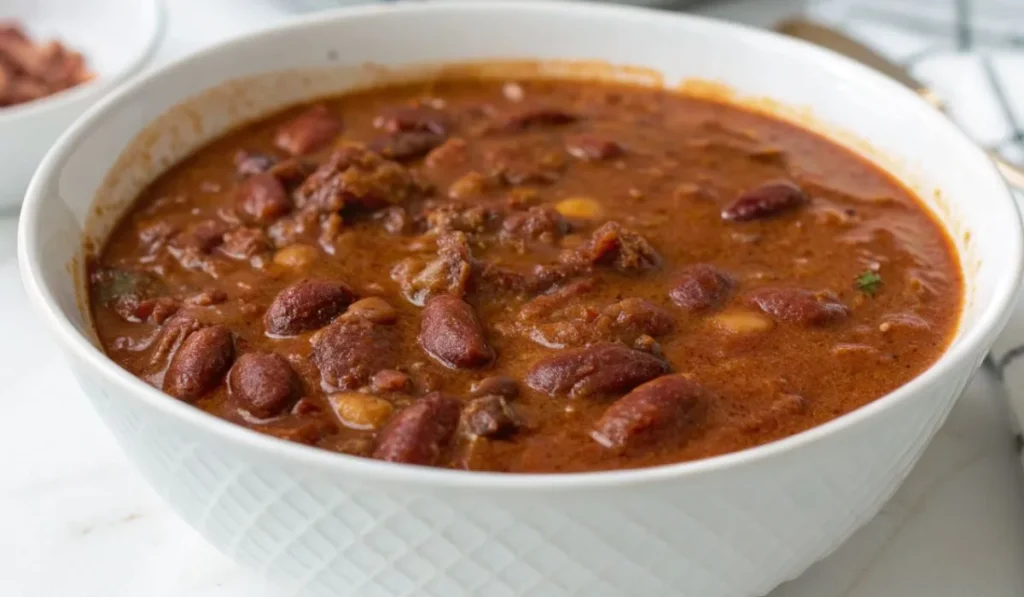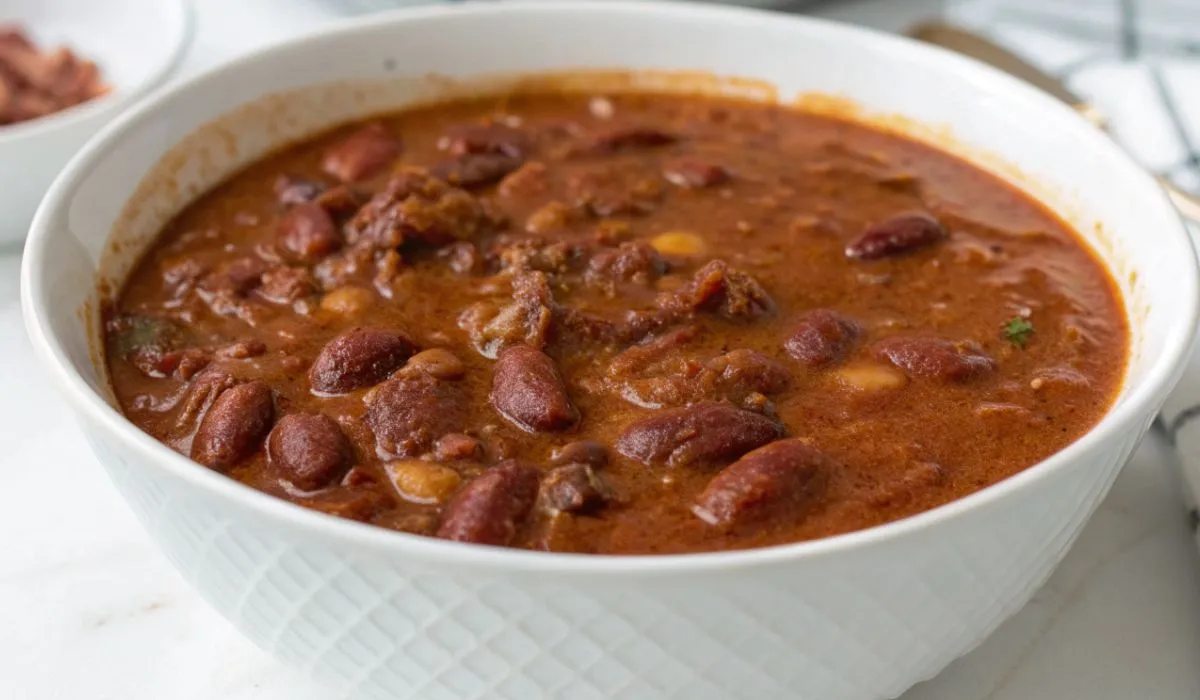This rajma recipe brings the authentic taste of Punjabi kitchens straight to your home.
As a chef who has perfected this kidney bean curry over countless Sunday lunches, I can tell you that mastering this dish changed how my family views vegetarian meals.
The creamy, spiced gravy paired with tender beans creates a satisfying meal that rivals any restaurant version.
After years of experimenting with different techniques, I’ve discovered the secrets to achieving that perfect restaurant-style taste every home cook craves.

Essential Ingredients for Perfect Rajma
Here’s what you need to create this flavorful kidney bean curry:
- 1 cup dried kidney beans (chitra rajma works best)
- 1 large onion, finely chopped
- 2 large tomatoes, finely chopped
- 3-4 garlic cloves
- 1-inch piece fresh ginger
- 1-2 green chilies
- 2 tablespoons butter plus 1 tablespoon oil
- 1/2 teaspoon cumin seeds
- 1 teaspoon coriander powder
- 1/4 teaspoon turmeric powder
- 1/2 teaspoon red chili powder
- 1/2 teaspoon garam masala
- 1 teaspoon kasuri methi (dried fenugreek leaves)
- 2-3 tablespoons cream
- Salt to taste
Step-by-Step Rajma Masala Instructions
Follow these simple steps to create your perfect kidney bean dish:
1. Preparing the Beans
- Soak rajma overnight in plenty of water (8-9 hours minimum)
- Drain and rinse the soaked beans thoroughly
- Pressure cook with 3.5 cups water for 18-20 whistles
- Check beans are completely soft and melt-in-mouth tender
- Reserve some cooking liquid for later use
2. Making the Spice Base
- Heat butter and oil in a heavy-bottomed pan
- Add cumin seeds and let them crackle
- Sauté chopped onions until golden brown and caramelized
- Add ginger-garlic-chili paste and cook for 10 seconds
- Mix in chopped tomatoes and cook until soft
- Add all spice powders and cook until oil separates
3. Combining Everything
- Add cooked rajma beans to the spice mixture
- Pour in 2 cups water or reserved bean stock
- Simmer uncovered for 10-12 minutes until curry thickens
- Mash a few beans with your spoon to thicken naturally
- Stir in kasuri methi and cream before serving
Pro Tips for Restaurant-Style Results
These techniques will elevate your rajma from good to exceptional:
- Always use fresh kidney beans under 6 months old
- Cook beans until they’re completely soft, not al dente
- Caramelize onions properly for deep flavor development
- Mash some beans to achieve the perfect creamy consistency
- Add cream at the end for that rich restaurant finish
- Let the curry rest for 10 minutes before serving
Common Mistakes to Avoid
Learn from my years of experience and sidestep these pitfalls:
- Never skip soaking beans overnight (causes poor texture)
- Don’t undercook the beans (leads to digestive issues)
- Avoid burning the onions (creates bitter flavors)
- Don’t add tomatoes too early (prevents proper browning)
- Skip adding salt while cooking beans (makes them tough)
- Never rush the simmering process (affects final consistency)
Serving Suggestions and Pairings
Rajma chawal (kidney beans with rice) is the classic combination for good reason:
- Serve hot with steamed basmati rice
- Pair with fresh naan or soft rotis
- Garnish with chopped cilantro and ginger julienne
- Add pickled onions on the side
- Include a dollop of plain yogurt for balance
- Squeeze fresh lemon juice just before eating
Storage and Reheating Tips
Proper storage keeps your rajma fresh and delicious:
- Store leftovers in refrigerator for up to 2 days
- Freeze portions for up to 3 months
- Add water when reheating as curry thickens
- Reheat gently to maintain texture
- Adjust seasoning after reheating if needed
- Never leave at room temperature for more than 2 hours
Variations and Substitutions
Adapt this recipe to suit your dietary needs and preferences:
- Use canned kidney beans to save time (two 15 oz cans)
- Make it vegan by skipping cream and using oil instead of butter
- Try coconut cream for dairy-free richness
- Add vegetables like bell peppers or carrots
- Use different bean varieties like black kidney beans
- Skip asafoetida for gluten-free version
Health Benefits of This Protein-Rich Dish
Rajma offers numerous nutritional advantages for your family:
- High in plant-based protein (9g per serving)
- Rich in fiber for digestive health
- Contains folate and iron for energy
- Low in fat when made without excess oil
- Provides complex carbohydrates for sustained energy
- Supports heart health with potassium and magnesium
This authentic rajma recipe has been my go-to comfort food for over a decade. I’ve served it to countless guests who always ask for the recipe. The key lies in patience during each step and using quality ingredients.
Whether you’re cooking for a weeknight dinner or Sunday family gathering, this kidney bean curry delivers consistent, restaurant-quality results that will have everyone coming back for seconds.
Remember, great rajma isn’t just about following a recipe, it’s about understanding how each ingredient contributes to the final dish.
With practice, you’ll develop an intuition for when the onions are perfectly caramelized and when the curry reaches that ideal consistency.

Restaurant-Style Rajma
Ingredients
Equipment
Method
- Soak the beans: Rinse and soak 1 cup rajma in plenty of water overnight or for 8-9 hours. Next day, discard soaking water and rinse beans thoroughly until water runs clear.
- Pressure cook beans: Add soaked and drained rajma to pressure cooker with 3.5-4 cups water. Cook for 18-20 whistles or 15-20 minutes at high pressure. Allow natural pressure release.
- Check doneness: Test beans by pressing between fingers – they should be completely soft and melt-in-mouth tender, not al dente. If needed, cook longer with additional water.
- Make spice paste: While beans cook, crush ginger, garlic, and green chilies in mortar-pestle to make a fine paste. Finely chop onions and tomatoes.
- Start curry base: Heat butter and oil in heavy-bottomed pan on medium-low heat. Add cumin seeds and let them crackle and brown.
- Sauté onions: Add chopped onions and sauté on medium heat, stirring frequently, until golden brown and caramelized. Don’t let them burn as this creates bitterness.
- Add aromatics: Lower heat and add ginger-garlic-chili paste. Sauté for 10 seconds until raw aroma disappears.
- Cook tomatoes: Add chopped tomatoes and sauté for 2-3 minutes on medium-low heat until soft and breaking down.
- Add spices: Add turmeric, red chili powder, coriander powder, asafoetida, and garam masala. Mix well and cook until oil starts separating from the masala, about 3-4 minutes.
- Combine beans: Using slotted spoon, add cooked rajma beans to the masala base. Stir and sauté for 1 minute to coat beans with spices.
- Add liquid and simmer: Pour in 2 cups water or reserved bean cooking liquid. Add salt to taste and bring to gentle boil.
- Thicken curry: Simmer uncovered for 10-12 minutes on low-medium heat. Mash a few beans with spoon against side of pan to naturally thicken the gravy.
- Final touches: When curry reaches desired consistency (neither too thick nor thin), stir in crushed kasuri methi and cream. Simmer for 1 minute more.
- Serve: Garnish with fresh cilantro and serve hot with steamed basmati rice, naan, or roti. Let curry rest 5 minutes before serving for best flavor.
